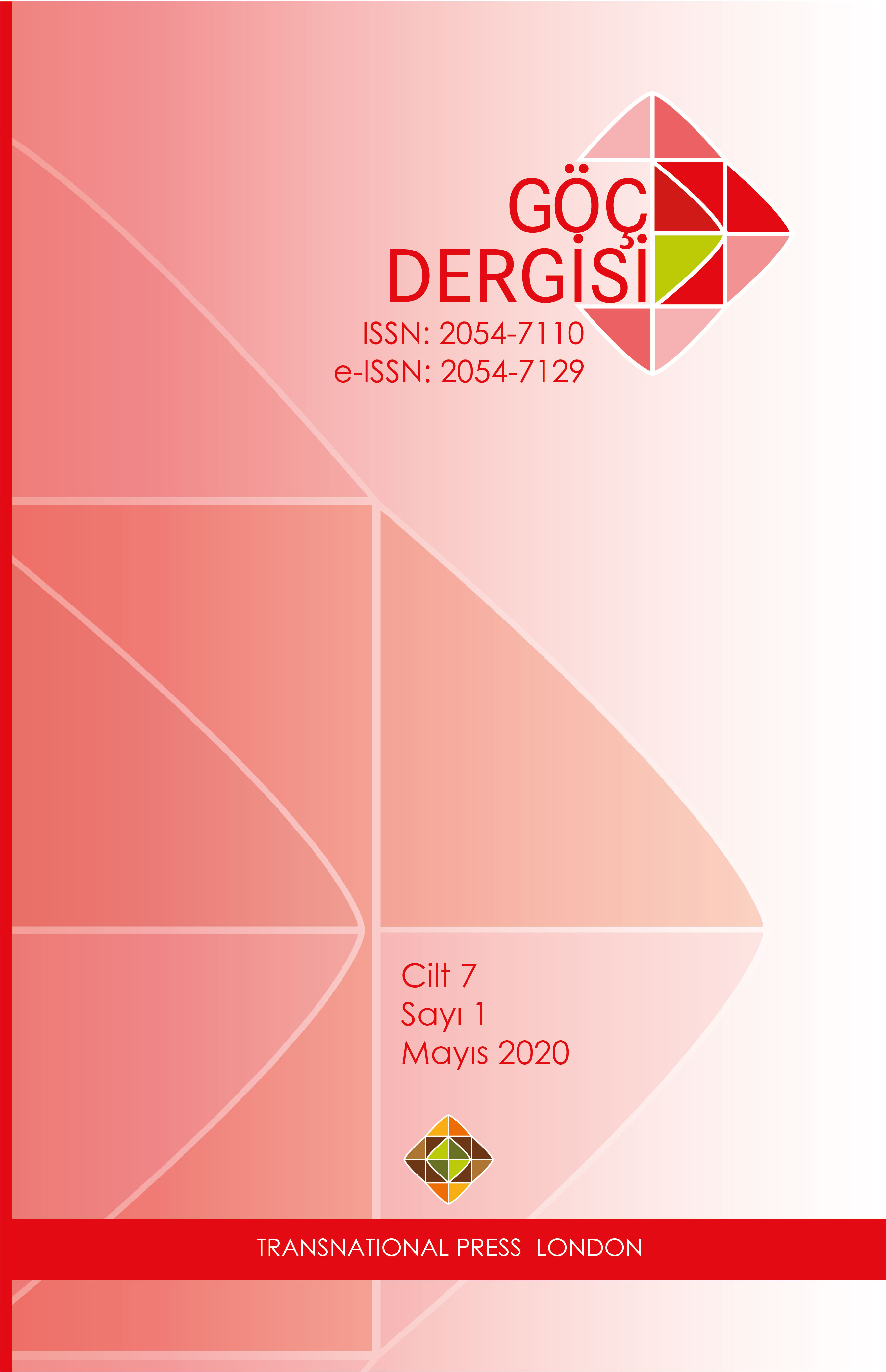Ahlaki Değerlerin “Devlet Sınırları” ve “Göçmen İşçilerin Üyelik Statüsü” Anlamları Üzerine Etkisi
DOI:
https://doi.org/10.33182/gd.v7i1.660Anahtar Kelimeler:
ahlaki değerler, devlet sınırları, üyelik statüsü, göç politikaları, göçmen işçiler, migrant workers, migration policy, membership status, borders, moral valuesÖzet
Bu makale, ahlaki değerlerin bölgesel sınırlar ve göçmen işçilerin üyelik statüsü kavramlarının anlamı üzerindeki etkisini ahlaki yapılandırmacı yaklaşım merceğinden incelemektedir. Paylaşılan değerlerin, devletlerin göç politikaları ve kanun yapma süreçlerinin merkezinde yer aldığını önermektedir. Devletler, sadece kolektif bir varlık haline gelen rastgele bir topluluk değil, ortak değerleri olan bireylerden oluşan değer topluluklarıdır. Göçmen işçilerin statüsü, 'değer topluluğuna' üyelikleriyle belirlenir; tartışılabilir bir şekilde, yasal terminolojiyi devlet düzeyinde biçimlendirmek için "geçirgen değerler" ve / veya "geçirimsiz değerler" kullanan kişilerden oluşuyor. Bu makalede, sosyal olarak yapılandırılmış değerlerin devlet politikalarını etkilediği, devlet sınırlarını ve göçmen işçilerin üyelik statülerini tanımladığı sonucuna varılan göç politikasının analizi için Türkiye vaka incelemesine odaklanılmaktadır. Analiz için, Türkiye'de toplanmış görüşmelerden ve katılımcı gözlemlerinden elde edilen birincil veriler ve yasal resmi belgelerdeki ikincil veriler kullanılmıştır.
ABSTRACT IN ENGLISH The Impact of Moral Values on the Meaning of the Borders and the Membership Status of Migrant WorkersThis paper analyses the impact of moral values on the meaning of the concept of territorial borders and the membership status of migrant workers through the lens of the moral constructivist approach. It suggests that shared values sit at the core of the states’ migration policies and law-making processes. States are not merely random collections of people that become a collective being but are communities of value that are consist of individuals who have shared values. Migrant workers’ status is determined by their membership to ‘community of value’ which arguably comprise of persons who use ‘porous values’ and/or ‘impermeable values’ to shape the legal terminology at the state level. The paper focuses on the case study of Turkey for the analysis of migration policy which concludes that socially constructed values influence the state policies and define borders and membership status of migrant workers. For the analysis, it uses primary data from interviews and participant observation; and secondary data from official legal documents collected in Turkey.
Referanslar
Anderson B. (2013) Us and Them? The Dangerous Politics of Immigration Control. Oxford: University Press.
Sonmez Efe, S. (2017) Legal Rights of Migrant Workers in Contemporary Turkey. Unpublished Doctoral Thesis. United Kingdom. Leeds Beckett University
Benhabib, S. (2004) the Rights of Others: Aliens, Residents and Citizens. United Kingdom: Cambridge University Press.
Benhabib, S. (2008) Another Cosmopolitanism. Oxford, New York: Oxford University Press.
Berger, P.L., & Luekmann, T. (1967) The social construction of reality: A treatise in the sociology of knowledge. Garden City: NJ. Anchor.
Bryman, A. (2012) Social Research Methods. Oxford: Oxford University Press.
Buzan B. and Wæver O. (2003) Regions and Powers: The Structure of International Security. Cambridge: Cambridge University Press.
Carens, J. (1995) Aliens and Citizens: The Case for Open Borders. In Ronald, B. (ed) Theorising Citizenship. New York, Suny Press.
Chatterjee, P. (1986) Nationalist Thought and the Colonial World: A Derivative Discourse. London: Zed Books
Creswell, J.W. (2014) Research Design: qualitative, quantitative and mixed method approaches. UK, India and Singapore: SAGE.
Crotty, M. (1998) The foundations of social research: Meaning and perspective in the research process. Thousand Oaks: CA. Sage.
Flikschuh, K. (2010) Kant’s Sovereignty Dilemma: A Contemporary Analysis. The Journal of Political Philosophy, 18(4) pp.469-493.
Formosa, P. (2013) Is Kant a Moral Constructivist or Moral Realist? European Journal of Philosophy, 21 (2) pp.170-196.
Gokalp Aras, N.E. and Sahin Mencutek, Z. (2015) The international migration and foreign policy nexus: the case of Syrian refugee crisis and Turkey. Migration Letters, 12(3) pp.193-208.
Held, D. (2002) The Law of States, Law of Peoples: Three Models of Sovereignty. Legal Theory, 8 (2) pp. 43-97.
Lincoln, Y.S., & Guba, E.G. (1985) Naturalistic inquiry. Beverly Hills: CA. Sage.
Lincoln, Y.S., Lynham, S.A., & Guba, E.G. (2011) Paradigmatic controversies, contradictions, and emerging confluences revisited. In: Creswell, J.W. (2014) Research Design: qualitative, quantitative and mixed method approaches. UK, India and Singapore: SAGE. Mertens, 2010.
Macedo, S. (2004) What Self Governing Peoples Owe to One Another: Universalism, Diversity and The Law of Peoples. Symposium on Rawls and the Law. Fordham Law Review. 72(5), pp.1721-1738.
Mason, J. (2002) Qualitative Researching. London, California, New Delhi and Singapore: SAGE.
Rawls, J. (1980) Kantian Constructivism in Moral Theory. The Journal of Philosophy, 77, pp. 515-72.
Rawls, J. (1999) The Law of Peoples. Cambridge, Mass.: Harvard University Press.
SRA (Social Research Association) (2003) Ethical Guidelines. Available from: ‹http://the-sra.org.uk/research-ethics/ethics-guidelines/› [Accessed 10 August 2014].
The Law No.403 Türk Vatandasligi Kanunu (Turkish Citizenship Law) (1964a) Available from ‹http://www.nvi.gov.tr/Files/File/Mevzuat/Yururlukten_Kaldirilanlar/Kanun/pdf/turk_vatandasligi_kanunu.pdf›[Accessed 12 November 2015].
The Law No.6458 on Foreigners and International Protection (2013) Official Gazette No: 28615. Available from Ministry of Interior Directorate General of Migration Management (DGMM), ‹http://www.goc.gov.tr/icerik6/11-dilde-yukk_327_328_1174_icerik› [Accessed 10 May 2013].
The Law No.6735 on International Labour Force (2016) Available from ‹https://www.tbmm.gov.tr/kanunlar/k6735.html› [Accessed 1 September 2016].
Timmons, M. (2003) The Limits of Moral Constructivism. Ratio, XVI: 391-423.
UN (United Nations) (1951) Convention and Protocol Relating to the Status of Refugees. Available at ‹http://www.unhcr.org/uk/protection/basic/3b66c2aa10/convention-protocol-relating-status-refugees.html› [Accessed 8 November 2013].







